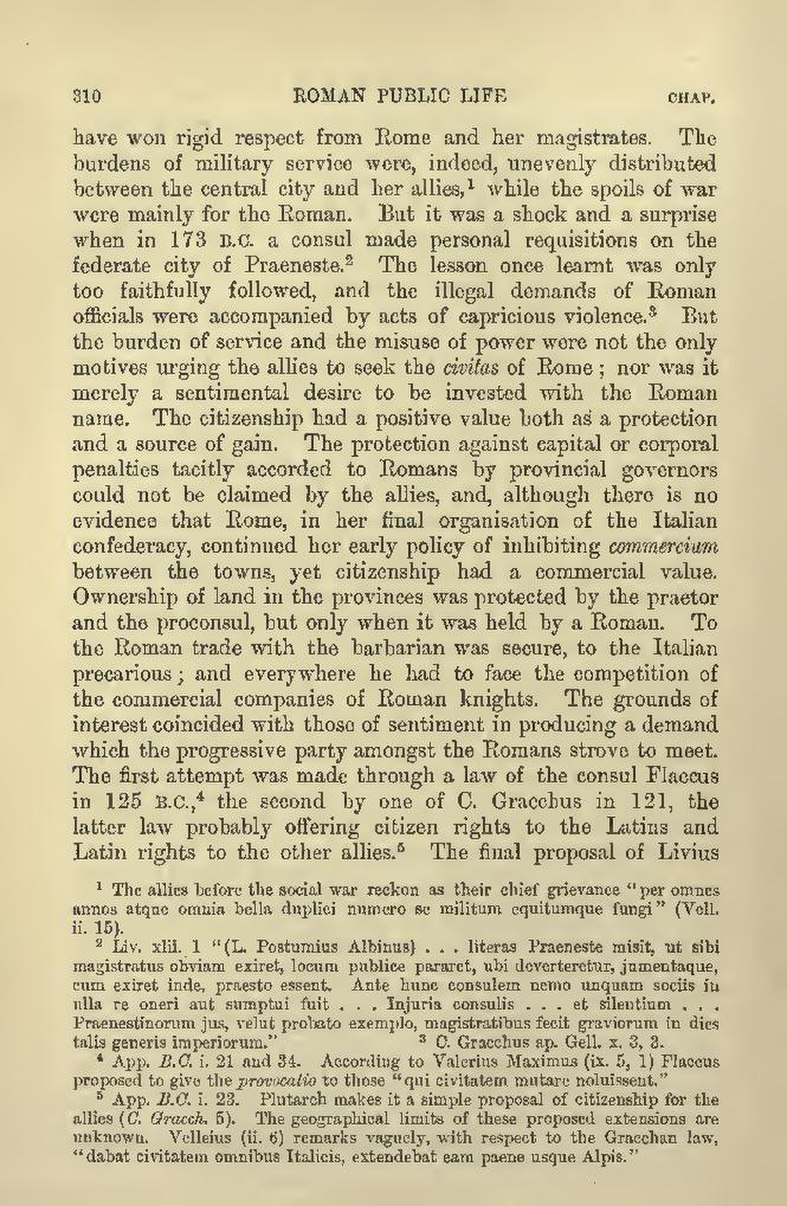have won rigid respect from Rome and her magistrates. The burdens of military service were, indeed, unevenly distributed between the central city and her allies,[1] while the spoils of war were mainly for the Roman. But it was a shock and a surprise when in 173 B.C. a consul made personal requisitions on the federate city of Praeneste.[2] The lesson once learnt was only too faithfully followed, and the illegal demands of Roman officials were accompanied by acts of capricious violence.[3] But the burden of service and the misuse of power were not the only motives urging the allies to seek the civitas of Rome; nor was it merely a sentimental desire to be invested with the Roman name. The citizenship had a positive value both as a protection and a source of gain. The protection against capital or corporal penalties tacitly accorded to Romans by provincial governors could not be claimed by the allies, and, although there is no evidence that Rome, in her final organisation of the Italian confederacy, continued her early policy of inhibiting commercium between the towns, yet citizenship had a commercial value. Ownership of land in the provinces was protected by the praetor and the proconsul, but only when it was held by a Roman. To the Roman trade with the barbarian was secure, to the Italian precarious; and everywhere he had to face the competition of the commercial companies of Roman knights. The grounds of interest coincided with those of sentiment in producing a demand which the progressive party amongst the Romans strove to meet. The first attempt was made through a law of the consul Flaccus in 125 B.C.,[4] the second by one of C. Gracchus in 121, the latter law probably offering citizen rights to the Latins and Latin rights to the other allies.[5] The final proposal of Livius
- ↑ The allies before the social war reckon as their chief grievance "per omnes annos atque omnia bella duplici numero se militum equitumque fungi" (Vell. ii. 15).
- ↑ Liv. xlii. 1 "(L. Postumius Albinus) . . . literas Praeneste misit, ut sibi magistratus obviam exiret, locum publice pararet, ubi deverteretur, jumentaque, cum exiret inde, praesto essent. Ante hunc consulem nemo unquam sociis in ulla re oneri aut sumptui fuit . . . Injuria consulis . . . et silentium . . . Praenestinorum jus, velut probato exemplo, magistratibus fecit graviorum in dies talis generis imperiorum."
- ↑ C. Gracchus ap. Gell. x. 3, 3.
- ↑ App. B.C. i. 21 and 34. According to Valerius Maximus (ix. 5, 1) Flaccus proposed to give the provocatio to those "qui civitatem mutare noluissent."
- ↑ App. B.C. i. 23. Plutarch makes it a simple proposal of citizenship for the allies (C. Gracch. 5). The geographical limits of these proposed extensions are unknown. Velleius (ii. 6) remarks vaguely, with respect to the Gracchan law, "dabat civitatem omnibus Italicis, extendebat eam paene usque Alpis."
